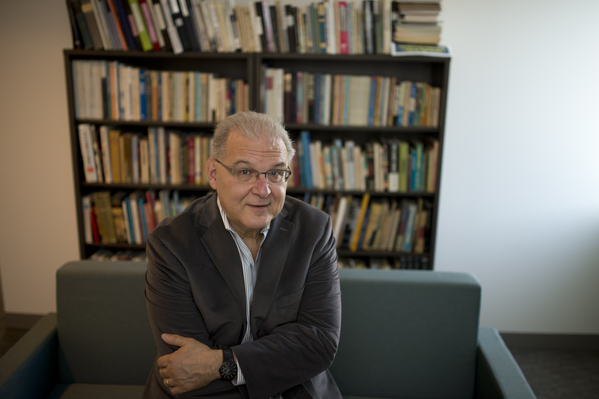Take 5: The life and literature of Gabriel García Márquez

Colombian novelist Gabriel García Márquez died last week at the age of 87. We asked Alan West-Durán, an associate professor in Northeastern’s Department of Languages, Literatures, and Cultures, to discuss the award-winning author’s life, literature, and legacy.
His book One Hundred Years of Solitude and magical realism:
One Hundred Years of Solitude is an immensely appealing novel, but not as easy a read as some claim. Everyone talks about the magical realism as synonymous with Latin American literature in general, which is unfortunate because you also have realist, fantastic, noir, neo-noir, the marvelous real, historical fiction, post-modernist narrative, and everything in between. García Márquez was himself conscious of this. Because of the popularity of One Hundred Years of Solitude, he became critical of its success, and to his credit his subsequent work did not prove to be sequels to One Hundred Years. He actively resisted that temptation, first publishing The Autumn of the Patriarch (1975), which he considered his best novel, and later Love in the Time of Cholera (1985), followed by The General in His Labyrinth (1989). None of these novels could be considered magical realist and all of them touch on themes that are central to many of his novels: love, power, and the ability for humans to transform themselves.
![Gabriel García Márquez. Photo credit: By Jose Lara [CC-BY-SA-2.0 (http://creativecommons.org/licenses/by-sa/2.0)], via Wikimedia Commons](http://www.northeastern.edu/news/wp-content/uploads/2014/04/ggm.jpg)
Gabriel García Márquez. Photo credit: By Jose Lara [CC-BY-SA-2.0 (http://creativecommons.org/licenses/by-sa/2.0)], via Wikimedia Commons
For Colombia he was a great source of pride—undoubtedly having a Nobel Prize winner puts one on the world literary map. The issue with García Márquez was that his outsized fame eclipsed all other writers form Colombia—and there are many good ones such as Alvaro Mutis (1923-2013), a close friend of García Márquez, Fernando Vallejo, Germán Espinosa, Laura Restrepo, Fanny Buitrago, William Ospina, Evelio Rosero, and Juan Gabriel Vásquez. This is part of the literary marketplace under late capitalism: U.S. and European critics and commentators latch on to a writer whom they claim represents a country or all of Latin America: Márquez, for one, but then Carlos Fuentes (México), Mario Vargas Llosa (Perú), Isabel Allende (Chile), Borges (Argentina), and Carpentier (Cuba). In terms of Latin America there is no doubt his work had a significant influence, be it the work of Isabel Allende (The House of the Spirits) or Laura Esquivel (Like Water for Chocolate). In any event, his writing helped redirect the Eurocentric bias of critics to other parts of the globe, specifically Latin America.
How his legacy endures on a global level:
One of the interesting corollaries of his work is in the area of film. García Márquez was an ardent admirer of cinema and a scriptwriter and there are many adaptations of his work to film. Most of them are unsuccessful, some are truly awful, and a few respectable (but none are admirable). The best are Arturo Ripstein’s No One Writes to the Colonel, based on his 1961 novella and then Ruy Guerra’s La cándida Erendira, based on a novella from 1978. The film Love in the Time of Cholera (2007), despite its savaging by the critics, was an adequate adaptation of his novel, but it is not a memorable film. More successful was Daniel Catan’s 1996 opera Florencia en las amazonas, a wonderfully lyrical adaptation of part of the novel. The short story La santa (The Saint), adapted to film in 1989 by Lisandro Duque and titled Milagro en Roma (Miracle in Rome), was a beautiful film marred by a kind of Hollywood happy ending.
To his credit, García Márquez helped fund the International Film School at San Antonio de los Baños in Cuba in 1986, a school that has helped train Latin American, African, and Asian film directors for decades.
One final film anecdote: The great Japanese film director Akira Kurosowa wanted to film The Autumn of the Patriarch, but felt intimidated by this project because he knew little or nothing about the Caribbean. He expressed these thoughts to García Márquez himself, who said that instead of trying to locate the film in 19th or 20th century Latin America he should instead shoot it as taking place in 16th century Japan. It was a brilliant idea by García Márquez that Kurosawa was never able to actually realize. When we think about his film Ran (based on Shakespeare’s King Lear), it makes us wonder if this could have been another Kurosawa masterpiece.
His personal life:
I think great writers create their own personal lives, and García Márquez was no exception. My favorite anecdote is from the writer himself. In interviews and autobiographical writings he describes his attempts, like any author, to establish his own authorial voice. As he sought to do so, he searched and struggled. He then read Kafka and remarked that Kafka’s way of narrating events was exactly the way his grandmother spoke—an unflappable tone, telling the most hair-raising events in a voice that was entirely calm and almost uninflected. To equate Kafka’s narrative voice with his grandmother’s style of speaking left me astounded and still does.
His later works about and close ties with political figures:
His later works continued his evolution as an artist. García Marquez was a man absolutely fascinated by power, which led to his irreverent view of Simón Bolívar, captured brilliantly in his novel The General in his Labyrinth, not to mention his novel The Autumn of the Patriarch, which chronicles the life of an aging dictator. Some have criticized his close relationship to Fidel Castro, leader of the Cuban Revolution, in that he had been very lenient in accepting left-wing excesses compared to those on the right. García Márquez never apologized for his left-wing views and argued that his friendship with Castro was helpful in negotiating some of the problems Cuban writers and intellectuals have had with the current regime in terms of more lenient views toward censorship or helping authors emigrate. García Márquez had also been a moderating voice on issues related to the Colombian government and the guerrilla movements within the country.





